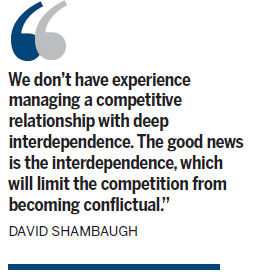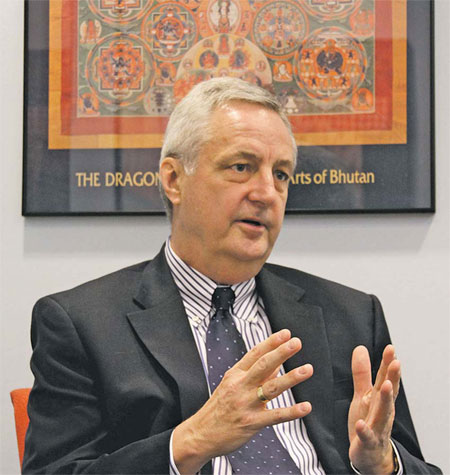Managing 'coopetition'
Updated: 2012-10-19 11:23
By Tan Yingzi (China Daily)
|
||||||||
|
Longtime China specialist David Shambaugh has high praise for Barack Obama's handling of US relations with China but says the president displayed "a little bit of naivete" in his early days in office when China didn't become the partner the White House had hoped it would be. Sun Chenbei / China Daily |

Tension between cooperation and competition is a defining characterist of the world's most important relationship, scholar David Shambaugh tells China Daily's Tan Yingzi in Washington.
As a dedicated China-watcher in Washington for three decades, David Shambaugh knows about the peaks and valleys in Chinese-US relations. But recent years have left him feeling uneasy.
Although the countries have vowed to build a "positive, cooperative and comprehensive" relationship, as President Hu Jintao said during his January 2011 visit to the United States, things have changed, and not for the better, Shambaugh believes.
With next month's leadership change in China and the US presidential election, it's time for both nations to learn to manage the competition between them while expanding their spheres of cooperation, he says.
Tangled Titans, a book published in August and edited by Shambaugh, examines the relationship between the world's economic superpowers and its defining push-pull of competitiveness and interdependency. In the short to medium term, the book posits, Chinese and US interests are linked in equal parts cooperation and competition, or "coopetition".
But this balance has shifted, according to Shambaugh.
"The competitive elements in the relationship are growing and now becoming primary, while the cooperative ones are secondary and declining," the George Washington University professor writes.
He has visited China for each of the past 32 years, including studies at Nankai, Fudan and Peking universities. He spent the 2009-2010 academic year as a Fulbright scholar in China, but this turned out to be an "unhappy" personal encounter with Chinese bureaucracy, Shambaugh said in an interview in his office at GW's Elliott School of International Affairs.
After returning to Washington, the scholar drew on his experiences in China for inspiration to probe the dynamics of the bilateral relationship. He contacted dozens of top US and Chinese experts to join him in his research.
The resulting book includes essays from Shambaugh and 15 other scholars on China-US relations as seen in the context of history, political theory, domestic politics, and regional and global interests.
"It's mainly a competitive relationship in all areas - economic, strategic, political, ideological, even cultural," Shambaugh told China Daily. "So this is a new characteristic of the relationship, and we have to get used to the fact that we are going to get a tense relationship. We cannot continue to naively hope that the two sides will love each other and get along."
The past 3 years have seen an unprecedented number of high-level meetings of Chinese and US officials, including 12 between Hu and President Barack Obama, the annual Strategic and Economic Dialogue, the Joint Commission on Commerce and Trade and several military exchanges.
In addition, the countries have worked together on a series of global and regional matters such as the financial crisis, climate change and nuclear security.
But despite the communication and cooperation, strategic distrust is on the rise, the number of trade disputes is increasing and many Americans regard China more as a competitor than a partner.
Shambaugh points out that the complexities are new for both nations.
"We don't have experience managing a competitive relationship with deep interdependence," he said. "The good news is the interdependence, which will limit the competition from becoming conflictual."
The only way out is "talk, talk and talk more" to improve mutual understanding, "because there is no alternative," the scholar said.
"There is a great deal of misperception - strategic mistrust between the two countries. We don't agree in a number of areas, so what we need to do is double our efforts trying to find some middle ground where we can hopefully work together. If we can't work together, then we have to agree to disagree, hopefully not to interfere with the other side's national interests."
Currently there are some 60 high-level dialogues between China and the US. Some analysts and media pundits have questioned whether these mechanisms can yield tangible results such as resolution of trade and currency disputes.
But Shambaugh believes the exchanges serve as forums for managing the competitive side of the relationship and are thus a stabilizing force.
"If not for those dialogues going on, the relationship would be even worse than it is. If we don't have them, the competition will be much sharper," he said.
The competition isn't limited to the two countries themselves. As Shambaugh points out, China is seeking to project power around the world, increasing its presence in the Asia-Pacific region, and investing heavily in energy and natural resources in Africa, the Middle East and Latin America.
As a newcomer to geopolitical expansion, China isn't yet on par with the US, the scholar said. While there is some two-way rivalry in the Asia-Pacific region, and competition for resources and economic superiority in the Middle East and Latin America, the US isn't as deeply involved in Africa.
"The US and China have a global relationship but they are not yet competitive," he said. "The two are on the modern dancing floor, dancing around each other, but they are not touching each other when dancing together. That means they aren't cooperating. This is kind of an awkward way of looking at each other, and the Chinese side has being very careful about not stepping on American toes."
The region Shambaugh worries about is Latin America, traditionally Washington's "back yard" but increasingly a place where China has been moving aggressively in commercial and military affairs. The US, in turn, is closely monitoring these actions.
"So far, the good news is that it is not a global competitive relationship, and we don't want it to become that way," he said. "We want the two countries to cooperate in aid policy, for example in Africa - both are leading donors. Also in disaster relief, international crimes, environmental issues, water issues and a whole range of nontraditional security issues."
Shambaugh acknowledged that Beijing has been working with Washington to stimulate the global economy since the 2008 financial crisis and ongoing debt problems among countries in the euro zone. China has played a leading role among the Group of 20 world economies to facilitate cooperation.
On other global issues, China needs to be more active and step up as the world's No 2 power, he said.
"Deng Xiaoping's principle of tao guang yang hui (keep a low profile and bide your time until success comes) sounds very passive now," he said. "Hopefully, after the 18th Party Congress [on Nov 8] and the new leadership comes in, we'll see more confidence on the part of Chinese leaders and a greater willingness to partner with the US and other countries."
But the China hand has found that Chinese people aren't yet ready for their country to take a leading role in the world. The country, he said, is caught between outmoded thinking and the new reality of what the world expects of it.
"It has to do with the narrative that China has been telling itself for the past 60 years: 'We were a poor country; we've been the victims of aggression for many years; we're an Asian country, not a global power; we are developing country.' But the world does not believe that any longer."
He understands that many Chinese fear that calls for assertiveness on the world stage is a trap that could enable the US to contain China or hold back its development.
"Again, it is the same old narrative of being afraid of the world. What is China afraid of? China doesn't need to be afraid, China needs to be confident. I can assure you it is not a trap, it's a partnership. When the world is facing major global challenges, major powers should work together to address those problems," he said.
Shambaugh gives Obama an "A" for his China policy so far.
"The only negative aspect of his policy toward China was a little bit of navet," he said, explaining that the president didn't seem to fully grasp the complexities of Chinese politics and had too-high expectations for the bilateral relationship when he took office.
"When China didn't step up and become the partner he wanted, he became a little bit disillusioned. For the last three years, we've seen a tougher, more pragmatic, more competitive policy toward China."
During the heat of the presidential race, both Obama and Republican challenger Mitt Romney have blamed China for the loss of American jobs to outsourcing as well as the trade deficit.
This week, in the candidates' second debate, Romney reiterated that he would label China a "currency manipulator" if elected and that a key part of his plan to fix the US economy plans is confronting China over allegedly unfair trade practices.
"China has become a real issue in the American presidential campaign," Shambaugh said. After Election Day on Nov 6, "it will be interesting to see how much of this issue becomes policy".
The harsh campaign rhetoric reflects dissatisfaction among Americans and their government about China's conduct in trade as well as other sticking points.
A survey this summer by the Pew Research Center showed that two-thirds of the US public and majorities in five expert groups (government, military retirees, business, academics and the media) see China as a competitor of the United States.
At the same time, most of the public and most experts said the US can't trust China. About half of Americans say its emergence as a world power makes China a major threat to the US.
And most respondents said they regard the huge amount of US government debt held by China, the loss of US jobs to China and the trade imbalance as serious problems.
"I don't think it's just a campaign issue, and it is likely to impact the policy of the next administration toward China," Shambaugh said.
"China needs to prepare itself for a tougher US in the coming years."
(China Daily 10/19/2012 page16)

 Relief reaches isolated village
Relief reaches isolated village
 Rainfall poses new threats to quake-hit region
Rainfall poses new threats to quake-hit region
 Funerals begin for Boston bombing victims
Funerals begin for Boston bombing victims
 Quake takeaway from China's Air Force
Quake takeaway from China's Air Force
 Obama celebrates young inventors at science fair
Obama celebrates young inventors at science fair
 Earth Day marked around the world
Earth Day marked around the world
 Volunteer team helping students find sense of normalcy
Volunteer team helping students find sense of normalcy
 Ethnic groups quick to join rescue efforts
Ethnic groups quick to join rescue efforts
Most Viewed
Economy on path of steady growth[1]|chinadaily.com.cn
Gay sex poses HIV threat for youth|Society|chinadaily.com.cn
Japan to release videos of Chinese activists|Asia-Pacific|chinadaily.com.cn
Gay sex blamed for rise in young students with HIV/AIDS|Society|chinadaily.com.cn
More young adults living with parents|Americas|chinadaily.com.cn
Magazine seeks Guangzhou expat families to tour Fujian[1]|chinadaily.com.cn
World's longest sightseeing escalator awaits you in Central China[4]|chinadaily.com.cn
Dai Ethnic Group[1]|chinadaily.com.cn
Minmetals unit offers sponge city solutions for rainfall usage|Business|chinadaily.com.cn
Licenses revoked in anti-porn campaign|Society|chinadaily.com.cn
Editor's Picks

|

|

|

|

|

|
Today's Top News
Health new priority for quake zone
Xi meets US top military officer
Japan's boats driven out of Diaoyu
China mulls online shopping legislation
Bird flu death toll rises to 22
Putin appoints new ambassador to China
Japanese ships blocked from Diaoyu Islands
Inspired by Guan, more Chinese pick up golf
US Weekly

|

|








